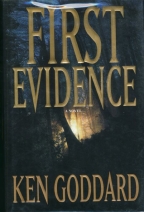First Evidence
Ken Goddard
Bantam / Random House
US Hardcover
ISBN 0-553-10864-6
Publication Date: 06-01-1999
427 Pages; $23.95
Date Reviewed: 09-03-02
Reviewed by Rick Kleffel © 2002

REFERENCES
COLUMNS
|
|
|
First EvidenceKen GoddardBantam / Random HouseUS HardcoverISBN 0-553-10864-6Publication Date: 06-01-1999427 Pages; $23.95Date Reviewed: 09-03-02Reviewed by Rick Kleffel © 2002 |
|
|
REFERENCES |
COLUMNS |
A brilliant set-up does not in itself guarantee a fantastic payoff. Thriller writer Ken Goddard takes a swing at writing a science fiction novel and manages to miss a great opportunity. Now, 'First Evidence' is a science fiction novel only in the sense that Michael Crichton's works are science fiction. It's a thriller that operates around a science fictional premise, and it's a hell of a premise. But with that premise the author makes a definite promise. When he defaults, when he doesn't deliver the delectable goods, he gets out there and annihilates any good will the reader has proffered. Make no mistake, I'm not opposed to reading a good cheesy thriller that delivers the page-turning thrills it promises. Mind-numbing fiction has a place in my reading queue. But I require that the writer who promises monsters in the sewers deliver monsters in the sewers. 'First Evidence' offers the casual book-buyer lots of evidence that it's going to deliver on a premise that is a pitchman's dream, and follows that up with Letters-To-Penthouse sex.
As a reviewer, I'm going to keep my promise and let the reader in on the premise. Colin Cellars is a crime scene investigator called in to take a look at a chaotic mess in a remote cabin in the Pacific Northwest. He can't confirm that there's been a crime or determine if the victim is in fact an old friend and there's no sign of any perpetrator. Slowly, Colin begins to suspect what the reader has known from the get-go: that he's investigating the site of an alien abduction. Here comes the pitch: 'First Evidence' is 'CSI' meets 'The X-Files'.
Except it's not nearly as good as either of those admittedly cheesy television series. Goddard begins the novel with six, count 'em six pages of "Excerpts from the Field Notebook of OSP Detective-Sergeant Colin Cellars". This includes a long and fascinatingly formatted evidence list, a thinly disguised cast of characters (some of whom the DS could not possibly have known about until well into the investigation) and a crime scene diagram of the cabin basement. Next, we get a quick intro shot -- since this book is written with less attention than the average movie treatment -- of the crime, where the alien is only seen in silhouette. There's a shadow, a shot, bright lights, fade to black.
What follows starts out intriguingly enough, with some nicely detailed descriptions of the initial police investigation that might make an episode of CSI. But as the plot plods on, readers keep waiting and waiting for Goddard to really get into the nitty-gritty of the forensic examination of the evidence from a scene of alien abduction.
Instead, Cellars runs into the mysterious Allesandra. You can tell by her name her part in the plot. As soon as Cellars bumps into her, the reader is subjected to scenes just this side of "Last night I met this girl and you just can't believe..." Of course, she's contrasted by the wholesomely named Jodie, whom Cellars realizes too late he should be interested in. And, while the reader is waiting for the dynamite takedown, where the evidence is deconstructed into a stunning proof that aliens are among us, instead, Goddard offers up the usual cringe-worthy caricatures of saucerheads. They are used to mercilessly lampoon that which lampoons itself. When Cellars delivers the goods, the exact goods that the reader's been waiting for, it's in a lecture to the saucerheads, in general terms, with none of the specifics used rather effectively earlier in the novel. It's so disappointing that readers will be hard pressed to care what's going to happen or why. Goddard tries to make something out of the "Skinemax" scenes and the result is actually more laughable than the lecture is disappointing. For those who like cheesy, sleazy romantic thrillers with a veneer of unscientific science fiction, 'First Evidence' might be an acceptable way to pass the time while waiting for that root canal. The dental procedure will seem utterly painless in contrast. For any other reader, 'First Evidence' should not even come up to the level of last resort.